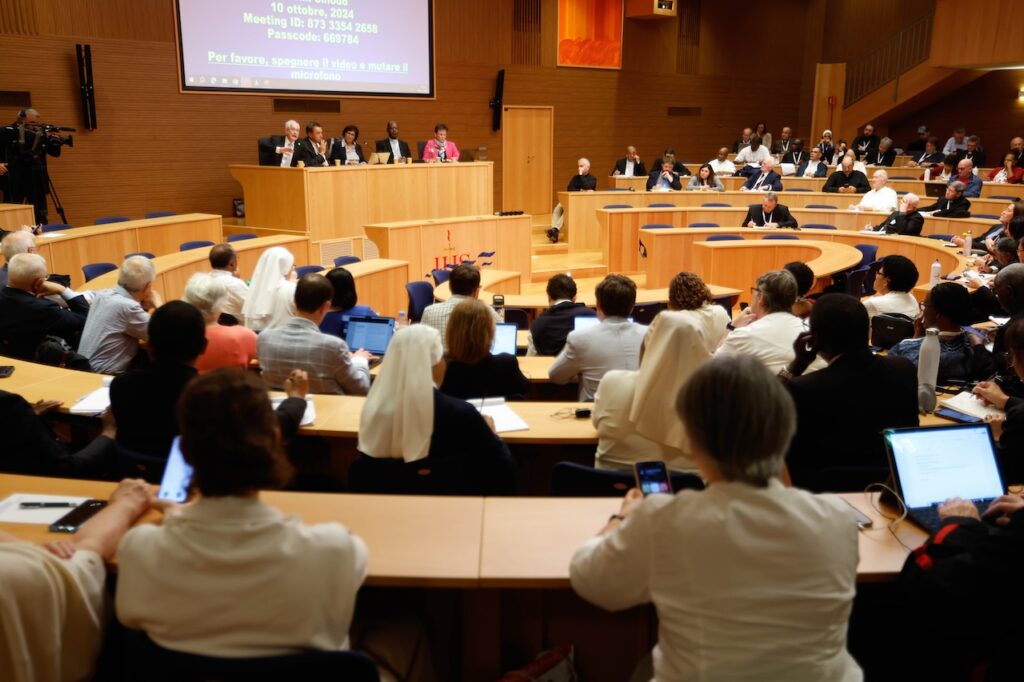ROME (CNS) — The pope, bishops and priests cannot fully awaken the missionary spirit of the Catholic Church alone, so all Catholics must play a more central role in spreading the Gospel, according to participants in the Synod of Bishops on synodality.
In today’s Church, where “theological competence is not only a privilege of priests and bishops” and where the lay faithful “demand participation and transparency,” synodality must empower all Catholics to actively participate in the church’s mission, said Thomas Söding, a theology professor at Ruhr University Bochum in Germany and a theological expert at the synod.
Speaking at a theological and pastoral forum in Rome organized by the General Secretariat of the Synod, Söding said that the model of the people of God as active participants in the Church’s mission is rooted in the New Testament.
He cited St. Paul’s Letter to the Ephesians to illustrate how early Christians “regard the apostles and prophets as the foundation of the church, but the Pauline concept of mission set forth that the members of the local churches find their own way in the freedom of the faith.”
In early Christianity, the apostles only stayed in towns and villages briefly to establish a community of believers and left once the communities were “equipped to live their faith,” he said.
The responsibility for growing that community of believers then fell to the people of God, Söding said. “Mission through attraction, that is the key.”
In the apostolic era, “we see the slow emergence of a canon of writings that interpret Jesus, that interpret the Gospel in diverse ways, but in ways that all the churches sense are in fidelity to the truth of Jesus Christ,” said Father Ormond Rush, a professor at Australian Catholic University and another theological expert at the synod.
Similarly, he said, the synod on synodality “is an interpreting subject, seeking in its ‘conversations in the spirit’ that spirit’s guidance for understanding for the 21st century” from among the experiences and inputs of synod members.
Father Rush noted that the faithful must be careful to avoid conceiving of the Church as an “ethereal subject floating through time,” unaffected by worldly circumstance, but must also recognize it as something beyond a purely human institution.
“Downplaying the divine element can lead to an understanding of synodality for example as a purely democratic process whereby majority rules,” he said. “Downplaying the human element, on the other hand, can lead to an understanding of synodality as a purely consultative process, where the true answers to contemporary problems from God’s perspective are known only to the bishops.”
Donata Horak, a professor of canon law at the Collegio Alberoni in Piacenza, Italy, discussed how canon law does not adequately reflect the understanding of the people of God as central to the Church’s mission.
She said that many sections of canon law still refer to the faithful as “subjects” and noted that the structures prescribed by canon law provide minimal opportunities for consultation.
While pastoral councils in local churches are optional, for example, the regulations for mandatory councils, such as parish finance councils, “do not include specific rules to promote transparency,” she said.
“Often these are councils of nominees appointed by the single authority, or if they are elected, they are elected without rules that guarantee the effective candidacy and participation of the whole people of God,” Horak said.
And while synods “are always only consultative, functional to the decision of a singular, monarchical authority,” deliberative councils are “underused” in the Latin church, she said.
“Synodality is deeper than monarchy, it is deeper than monarchy,” Horak said. “We must rediscover a shared, deliberative vote distributed among different subjects and plural- and inter-ministerial bodies composed on the basis of competence on the matter in question.”
On a local level, pastoral councils should “reflect the people of God, taking account the areas of a diocese, professions, competencies and different characteristics,” she said. “The hierarchical precept must be re-understood in a dynamic of ecclesial relations that are complex.”

